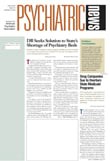Susan, a 61-year-old Floridian, will never forget that day 50 years ago. It was the worst day of her life. She came home from school to find her father lying on the hallway floor. He had killed himself by putting a gun to his head. He had suffered from bipolar disorder.
Indeed, it is common knowledge among psychiatrists in Western countries that bipolar patients are at considerable risk of suicide. But what many such psychiatrists may not know is that bipolar patients in the Far East also have much higher suicide risk. So Shang-Ying Tsai, M.D., chief of psychiatry at Taipei Medical University in Taiwan, and his colleagues decided to undertake a study to identify risk factors associated with suicide in Taiwanese bipolar patients. Their findings are reported in the June Journal of Clinical Psychiatry.
Tsai’s team followed the fates of all acute inpatients diagnosed with bipolar I disorder at the Taipei City Psychiatry Center from 1985 until the end of 1996. Psychiatric diagnoses were based on DSM-III, DSM-III-R, or DSM-IV criteria, which were the criteria of the diagnostic systems used in the hospital during the 1980s and the 1990s. The researchers wanted to determine which of the inpatients had completed suicide. Forty-three were found to have done so and served as subjects for their study.
Tsai and his team then matched 41 out of the 43 patients with persons who had also been bipolar inpatients at the hospital but who had not completed suicide. The 41 patients were matched according to age, sex, and date of hospital admission. They thus served as controls for the study.
Tsai and his coworkers then compared demographic data, family history information, and clinical characteristics of the 43 subjects with similar data for the 41 controls. They reasoned that any data, information, or characteristics unique to the study subjects would constitute risk factors for completed suicide in bipolar disorder patients.
“To the best of our knowledge,” they wrote in their study report, “this is the first study of a non-Western bipolar sample incorporating sex- and age-matched living controls to examine variables associated with completed suicide.”
Tsai and his coworkers also believed that any results they obtained would be especially solid because they would not be contaminated with the potentially confounding factor of substance abuse. In other words, whereas some 30 percent of bipolar patients in the West abuse drugs, under 10 percent in Taiwan do.
A greater proportion of suicide completers than of controls had a first-degree relative who had committed suicide, Tsai and his colleagues found, and the difference was statistically significant. Thus, having a first-degree relative who committed suicide appears to be a risk factor for completed suicide in Taiwanese patients with bipolar disorder.
The researchers also discovered that more suicide completers than controls had made previous suicide attempts, and again the difference was statistically significant. So they also consider previous suicide attempts a risk factor for completed suicide in Taiwanese with bipolar illness.
Further, suicide completers were less likely to display mood-congruent psychotic features at illness onset than controls, Tsai and his team found. Once again the difference was statistically significant. So they believe that moods that are inappropriate to delusions and hallucinations at illness onset may be another risk factor for completed suicide in their study population.
“This study fills an important gap in our studies of suicide in bipolar disorder,” Stephen Strakowski, M.D., a professor of psychiatry at the University of Cincinnati and a bipolar disorder authority, told Psychiatric News. “Namely, our work has tended to be restricted to Western cultures, which ignores the majority of people on our planet.”
Some of Tsai’s findings, Strakowski continued, mirror what Western researchers have found—for instance, that there is an increased risk of suicide in bipolar patients who have made previous attempts. But the link the Taiwanese team has made between mood incongruent psychosis and suicide does not seem to have been made in the West. So with this study, Strakowski said, “they may have identified a risk factor unique to Taiwan or to their patient sample.”
So what is probably needed at this juncture is a world view of suicide risk factors for bipolar disorder. And Tsai and his colleagues are going to try to obtain such a perspective, Tsai told Psychiatric News. They and several Swedish scientists will be collaborating on a three-year international investigation into the subject.
The study by Tsai and his team was financed by a research grant from the National Science Council of Taiwan.
An abstract of the study, “Risk Factors for Completed Suicide in Bipolar Disorder,” is posted on the Web at www.psychiatrist.com/abstracts/200206/ab060201.htm. ▪
